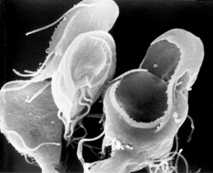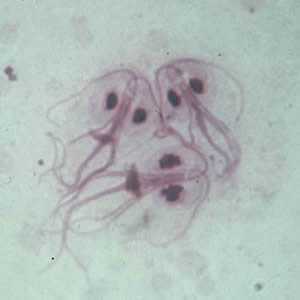General Information
What is giardiasis?

G. intestinalis trophozoites in a Giemsa stained mucosal imprint. Photo credit: DPDx, CDC
Giardiasis is a diarrheal disease caused by the microscopic parasite Giardia. A parasite is an organism that feeds off of another to survive. Once a person or animal (for example, cats, dogs, cattle, deer, and beavers) has been infected with Giardia, the parasite lives in the intestines and is passed in feces (poop). Once outside the body, Giardia can sometimes survive for weeks or months. Giardia can be found within every region of the U.S. and around the world.
How do you get giardiasis and how is it spread?

G. intestinalis trophozoites in a Giemsa stained mucosal imprint. Photo credit: DPDx, CDC
Giardiasis can be spread by:
- Swallowing Giardia picked up from surfaces (such as bathroom handles, changing tables, diaper pails, or toys) that contain feces (poop) from an infected person or animal
- Drinking water or using ice made from water sources where Giardia may live (for example, untreated or improperly treated water from lakes, streams, or wells)
- Swallowing water while swimming or playing in water where Giardia may live, especially in lakes, rivers, springs, ponds, and streams
- Eating uncooked food that contains Giardia organisms
- Having contact with someone who is ill with giardiasis
- Traveling to countries where giardiasis is common
Anything that comes into contact with feces (poop) from infected humans or animals can become contaminated with the Giardia parasite. People become infected when they swallow the parasite. It is not possible to become infected through contact with blood.
What are the symptoms of giardiasis?
Giardia infection can cause a variety of intestinal symptoms, which include:
- Diarrhea
- Gas or flatulence
- Greasy stool that can float
- Stomach or abdominal cramps
- Upset stomach or nausea
- Dehydration
These symptoms may also lead to weight loss. Some people with Giardia infection have no symptoms at all.
How long after infection do symptoms appear?
Symptoms of giardiasis normally begin 1 to 3 weeks after becoming infected.
How long will symptoms last?
In otherwise healthy people, symptoms of giardiasis may last 2 to 6 weeks. Occasionally, symptoms last longer. Medications can help decrease the amount of time symptoms last.
Who is most at risk of getting giardiasis?

Children in childcare settings, especially diaper-aged children are at risk for Giardia exposure.
Though giardiasis is commonly thought of as a camping or backpacking-related disease and is sometimes called "Beaver Fever," anyone can get giardiasis. People more likely to become infected include:
- Children in childcare settings, especially diaper-aged children
- Close contacts of people with giardiasis (for example, people living in the same household) or people who care for those sick with giardiasis
- People who drink water or use ice made from places where Giardia may live (for example, untreated or improperly treated water from lakes, streams, or wells)
- Backpackers, hikers, and campers who drink unsafe water or who do not practice good hygiene (for example, proper handwashing)
- People who swallow water while swimming and playing in recreational water where Giardia may live, especially in lakes, rivers, springs, ponds, and streams
- International travelers
- People exposed to human feces (poop) through sexual contact
What should I do if I think I may have giardiasis?
Contact your healthcare provider.
How is giardiasis diagnosed?
Your healthcare provider will ask you to submit stool (poop) samples to see if you are infected. Because testing for giardiasis can be difficult, you may be asked to submit several stool specimens collected over several days.
What is the treatment for giardiasis?
Many prescription drugs are available to treat giardiasis. Although the Giardia parasite can infect all people, infants and pregnant women may be more likely to experience dehydration from the diarrhea caused by giardiasis. To prevent dehydration, infants and pregnant women should drink a lot of fluids while ill. Dehydration can be life threatening for infants, so it is especially important that parents talk to their healthcare providers about treatment options for their infants.
My child does not have diarrhea, but was recently diagnosed as having a Giardia infection. My healthcare provider says treatment is not necessary. Is this correct?
Your child does not usually need treatment if he or she has no symptoms. However, there are a few exceptions. If your child does not have diarrhea, but does have other symptoms such as nausea or upset stomach, tiredness, weight loss, or a lack of hunger, you and your healthcare provider may need to think about treatment. The same is true if many family members are ill, or if a family member is pregnant and unable to take the most effective medications to treat Giardia. Contact your healthcare provider for specific treatment recommendations.
If my water comes from a well, should I have my well water tested?
What can I do to prevent and control giardiasis?
To prevent and control infection with the Giardia parasite, it is important to:
- Practice good hygiene
- Avoid water (drinking or recreational) that may be contaminated
- Avoid eating food that may be contaminated
- Prevent contact and contamination with feces (poop) during sex
For more information, see Prevention & Control.
Can I get giardiasis from my pet?
The risk of humans acquiring Giardia infection from dogs or cats is small. The exact type of Giardia that infects humans is usually not the same type that infects dogs and cats.
For more information, see Giardia and Pets.
- Page last reviewed: July 21, 2015
- Page last updated: July 21, 2015
- Content source:


 ShareCompartir
ShareCompartir